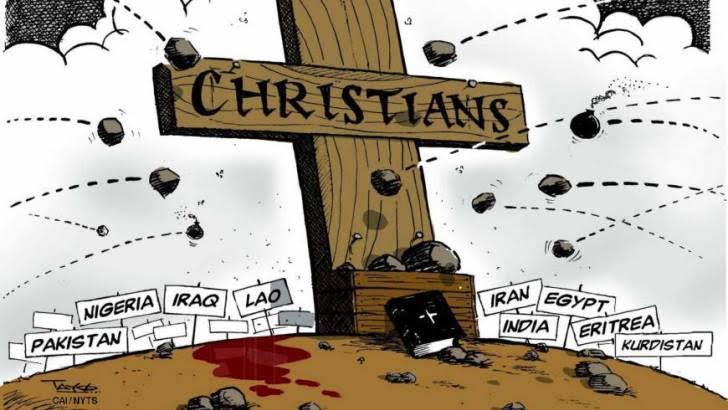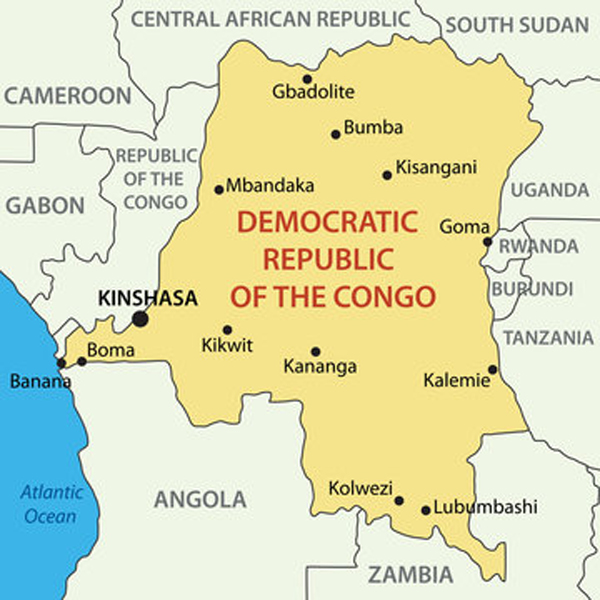world news
‘Ever-Present’ Persecution in Bangladesh and Sri Lanka

Washington — In countries like Myanmar and Nigeria, acts of persecution against Christians are more likely to make news reports because of their extreme violence. But in many other locations, persecution typically takes on a more subtle form. It likely won’t make any media outlet and might not have any documentation at all. But it’s still an ever-present issue that diminishes the quality of life for many Christians.
One place where such persecution occurs is Bangladesh, a South Asian nation with an overall population of 170 million, where over 90% of the people are Muslim and most of the remaining portion are Hindu.
Thomas (real name withheld to protect identity), a Christian in Bangladesh, says that many people “express their desire for conversion” to Christianity, but they don’t follow through with it due to “threats of killing and persecution.”
Many children in Bangladesh “grow up with a nasty mentality to hate other faiths,” says Thomas. In the villages, these children often target the Christian families “to steal and destroy farms and gardens.” He adds that when Christians protest such behavior, then things become more aggressive.
In the cities, says Thomas, anti-Christian sentiment can surface through harassment from non-Christian employees or having non-Christian employees refuse to cooperate with the Christian employee. The Christian employee might also get stuck with job duties on a Sunday, so that they might have to choose between attending church or keeping their job.
Thomas isn’t sure exactly what percent of Bangladeshi Muslims support acts of persecution against Christians. He says, though, that it doesn’t take much to spoil the “full bucket of milk.”
He gives the example in which you might have “just one person doing anti-Christian activities in a large Muslim family.” Maybe the other family members “silently support it,” or maybe they themselves “are also afraid” of their hostile family member. It can be very difficult for an outsider to determine which case is the reality. But either way, nobody discourages the person from acting on his hostility.
Thomas says that “anti-Christian mentality is present throughout” the country among Muslims who are either uneducated or who study in fundamentalist madrassas which teach that Bengali is not a Muslim language, and that Islam is the only legitimate religion. “It’s enough to make a soft brain child into a violent fanatic,” says Thomas.
Rates of Christianity are much higher among indigenous ethnic minorities in Bangladesh. Thomas says these indigenous Christians are typically “very humble and hospitable,” especially to a wandering laborer “who comes very helplessly to work in the area.”
Thomas shares a scenario in which a Muslim might come to a Christian household to do agricultural work. The Christian family might give the Muslim some land to live on. Then, the Muslim “calls other relatives and builds a mosque with bamboo.”
At this point, the guest might start to act like he’s the owner. Thomas says then “they become a threat to local people … they take away crops, steal fruits and vegetables, make a chaos without any cause.” At this point, the host family will have “lost their inner silence,” he adds.
As for legal recourse, Thomas says how, “Without a complaint, the police have no responsibilities. And if you go to complain, you have to pay an official fee with a big bundle.” Then the police want evidence. “How do you show bullying and tricking?” asks Thomas.
People tend to view filing a criminal complaint as a major source of harassment. As Thomas explains, “If the police call you to the station, you lose your daily wage and maybe even your job.” And “if the police come to your home, you need to make them happy with some external hospitality, otherwise the report will be against you.”
“Sometimes, the village chief or higher authority supports people against the Christians,” says Randall (real name withheld to protect identity), a pastor from northern Bangladesh. He adds that Christian converts from Muslim backgrounds have a slim chance at receiving fair treatment.
Bangladesh’s secular federal government has expressed its concern about Islamic extremism, but Randall feels that the effort they make about persecution is “not fruitful action.”
In Randall’s view, “above 90 percent of Bangladeshi Muslims support acts of persecution against Christians.” He estimates that about half of Bangladeshi Hindus support such acts.
Another South Asian nation, Sri Lanka, has an unusual degree of religious diversity, with four major religions forming considerable percentages of the population (about 70% Buddhist, a bit more than 10% Hindu, and Christians and Muslims each a bit under 10%).
Aside from the catastrophic 2019 Easter bombings that struck multiple churches and luxury resorts, persecution of Sri Lanka’s Christians typically isn’t of the sort that makes headlines. And yet it can be a constant issue.
Elias (real name withheld to protect identity), a Catholic in northern Sri Lanka, says he doesn’t know of any cases of Sri Lankans having their land taken specifically because of their Christian faith.
“But when it comes to the workplace, [Sri Lankan] Christians face a lot of challenges,” he says. “They need to work harder than the other laborers to survive in that workplace.” And in many cases, “They’re unable to reach the top positions even if they have talents to lead,” he adds.
Persecution against Christians in Sri Lanka is often linked to Buddhist nationalism that is prominent among the majority ethnic group, known as the Sinhalese.
But Elias says that Sri Lanka’s Muslims persecute against Christians in a way that is disproportionately stronger than the part of the overall population they form. This type of persecution, he says, is more pronounced on the country’s eastern coast, which has a higher Muslim population.
Meanwhile, in Bangladesh, with its overwhelming Muslim majority, some Christians are compelled to “depend on Muslim lawyers to fight against [other] Muslims” who have taken their land by coercion or with fake documents, says Thomas. These lawyers “are very clever,” he adds. They “take away money from the Christians” and then work on behalf of the Muslims.
Thomas feels that Christians are powerless to solve this problem either legally or illegally. “So, it stays as is.”
Making their way to Christian households are the next round of itinerant laborers. As Thomas describes, “They come as a humble cat and then become a tiger.”
Sources:persecution
world news
സൗദി റിയാലിന് പുതിയ ചിഹ്നം

റിയാദ് : സൗദി റിയാലിന് പുതിയ ചിഹ്നം പ്രഖ്യാപിച്ച് സൗദി അറേബ്യ. ദേശീയ കറൻസിയുടെ ഐഡന്റിറ്റി ശക്തിപ്പെടുത്തുന്നതിനുള്ള നടപടിയുടെ ഭാഗമായാണ് പുതിയ ചിഹ്നം അവതരിപ്പിച്ചത്. അറബിക് കാലിഗ്രാഫിയിൽ നിന്നും പ്രചോദനം ഉൾക്കൊണ്ടുള്ള ഒരു രൂപകൽപ്പനയാണ് ചിഹ്നത്തിൽ ഉപയോഗിച്ചിരിക്കുന്നത്.
പുതിയ ചിഹ്നം പുറത്തിറക്കിയ വേളയിൽ, സെൻട്രൽ ബാങ്ക് ഗവർണർ അയ്മാൻ അൽ സയാരി, രാജാവ് സൽമാൻ ബിൻ അബ്ദുൽ അസീസിനും കിരീടാവകാശിക്കും നന്ദി അറിയിച്ചു. റിയാൽ ചിഹ്നം പ്രാദേശിക, രാജ്യാന്തര തലങ്ങളിൽ രാജ്യത്തിന്റെ സാമ്പത്തിക ഐഡന്റിറ്റിക്ക് കരുത്തേകുമെന്നും അദ്ദേഹം പറഞ്ഞു. പുതിയ ചിഹ്നം ഉടൻ തന്നെ ഉപയോഗത്തിൽ വരുത്തുമെന്നും സാമ്പത്തിക, വാണിജ്യ ഇടപാടുകളിൽ ഇത് ക്രമേണ പ്രതിഫലിക്കുമെന്നും അദ്ദേഹം കൂട്ടിച്ചേർത്തു.
ദേശീയ സ്വത്വത്തിലും സാംസ്കാരിക ബന്ധത്തിലും അഭിമാനം വളർത്തുക, സൗദി റിയാലിന്റെ പദവി ഉയർത്തിക്കാട്ടുക, ആഗോള സമ്പദ്വ്യവസ്ഥയിൽ രാജ്യത്തിന്റെ സ്ഥാനം തെളിയിക്കുക എന്നിവയാണ് ചിഹ്നത്തിന്റെ ലക്ഷ്യങ്ങൾ.
Sources:globalindiannews
Saudi Arabia has introduced a new symbol for its local currency as part of efforts to establish the kingdom as a global financial hub.
The design, made up of Arabic calligraphy of the word riyal, will be implemented gradually for use in financial and commercial transactions, according to a statement from the country’s central bank.
The Saudi riyal has been pegged to the US Dollar since 1986 and is set at a fixed exchange rate of 3.75 riyals per $1. The peg has long helped the country facilitate international trade and investment, and serves the country’s broad Vision 2030 agenda to diversify the economy.
Under Crown Prince Mohammed bin Salman, the government has been spending hundreds of billions of dollars on everything from new cities to sports, tourism and technology. Saudi Arabia has also attracted hundreds of companies including Goldman Sachs Group Inc. and BlackRock Inc. to set up offices in Riyadh as it seeks to develop the capital into the Middle East’s premier business destination.
http://theendtimeradio.com
world news
കോംഗോയിലെ ദേവാലയത്തില് 70 ക്രൈസ്തവരെ ഇസ്ലാമിക് സ്റ്റേറ്റ്സ് തീവ്രവാദികള് കഴുത്തറത്ത് കൊലപ്പെടുത്തി

ബ്രാസാവില്ല: ആഫ്രിക്കന് രാജ്യമായ ഡെമോക്രാറ്റിക് റിപ്പബ്ലിക് ഓഫ് കോംഗോയിലെ ക്രൈസ്തവ ആരാധനാലയത്തില് എഴുപത് ക്രിസ്ത്യാനികളെ ശിരഛേദം ചെയ്ത നിലയിൽ കണ്ടെത്തി. രാജ്യത്തിൻ്റെ വടക്ക് കിഴക്കൻ ഭാഗത്ത് ക്രൈസ്തവ വിശ്വാസികൾക്ക് നേരെ നടന്ന ഏറ്റവും പുതിയ ആക്രമണമാണിതെന്ന് വിവിധ പ്രാദേശിക മാധ്യമങ്ങള് റിപ്പോര്ട്ട് ചെയ്യുന്നു. ഫെബ്രുവരി 13 വ്യാഴാഴ്ച പുലർച്ചെ 4 മണിയോടെ, ഇസ്ലാമിക് സ്റ്റേറ്റ്സുമായി ബന്ധമുള്ള സഖ്യകക്ഷികളായ ഡെമോക്രാറ്റിക് ഫോഴ്സിലെ (എഡിഎഫ്) തീവ്രവാദികളാണ് ആക്രമണം നടത്തിയത്.
എഡിഎഫ് തീവ്രവാദികൾ ഗ്രാമം വളഞ്ഞു 50 ക്രൈസ്തവ വിശ്വാസികളെ കൂടി പിടികൂടി. പിന്നീട് ഇരുപതു പേരെ കൂടി ബന്ദികളാക്കി 70 പേരെയും കസങ്കയിലെ പ്രൊട്ടസ്റ്റൻ്റ് ആരാധനാലയത്തില് കൊണ്ടുപോയി ദാരുണമായി കഴുത്ത് അറത്ത് കൊലപ്പെടുത്തുകയായിരിന്നുവെന്ന് വിവിധ മാധ്യമങ്ങള് റിപ്പോര്ട്ട് ചെയ്യുന്നു. ക്രൈസ്തവ നരഹത്യ അരങ്ങേറി ദിവസങ്ങള്ക്ക് ശേഷമാണ് പുറംലോകം വാര്ത്ത അറിയുന്നത്. സുരക്ഷ സാഹചര്യം താറുമാറായ പശ്ചാത്തലം കണക്കിലെടുത്ത് സംഭവത്തിന് മുന്പ്, പള്ളികളും സ്കൂളുകളും ആരോഗ്യ കേന്ദ്രങ്ങളും അടച്ചിരുന്നുവെന്ന് കോംബോ പ്രൈമറി സ്കൂൾ ഡയറക്ടർ മുഹിന്ദോ മുസുൻസി വെളിപ്പെടുത്തി.
രാജ്യത്തിൻ്റെ വടക്ക് കിഴക്കൻ മേഖലയിൽ എഡിഎഫ് തീവ്രവാദികൾ ഉയർത്തുന്ന ഭീഷണിയുടെ തുടർച്ചയാണ് ഏറ്റവും പുതിയ ഈ ദാരുണ സംഭവം. 2014-ൽ, നോർത്ത് കിവു പ്രവിശ്യയിലെ ബെനി പ്രദേശത്ത് സംഘം ആക്രമണം ശക്തമാക്കിയിരിന്നു. അതിനുശേഷം ആക്രമണങ്ങൾ ഇറ്റുരി പ്രവിശ്യയിലെ ഇരുമു, മംബസ പ്രദേശങ്ങളിലേക്ക് വ്യാപിച്ചു. കഴിഞ്ഞ മാസത്തിൽ മാത്രം, ബസ്വാഘ മേഖലയില് ഇരുനൂറിലധികം പേരെ സംഘം കൊന്നു. കഴിഞ്ഞ വർഷം, കോംഗോയില് 355 ക്രൈസ്തവരാണ് വിശ്വാസത്തിൻ്റെ പേരിൽ കൊല്ലപ്പെട്ടത്. മുൻ വർഷം 261 ആയിരുന്നു.
അതേസമയം 10,000 സാധാരണക്കാര് ആഭ്യന്തരമായി കുടിയൊഴിപ്പിക്കപ്പെട്ടു. ക്രൈസ്തവര് തിങ്ങി പാര്ത്തിരിന്ന നിരവധി ക്രിസ്ത്യൻ ഗ്രാമങ്ങൾ പൂർണ്ണമായും ഉപേക്ഷിക്കപ്പെട്ടു. റുവാണ്ടയുടെ പിന്തുണയുള്ള M23 വിമത ഗ്രൂപ്പാണ് സമീപകാല ആക്രമണങ്ങളില് ക്രൈസ്തവര്ക്ക് വലിയ ഭീഷണി ഉയര്ത്തിക്കൊണ്ടിരിക്കുന്നത്. കഴിഞ്ഞ വര്ഷം കോംഗോയില് ഇസ്ലാം മതം സ്വീകരിക്കാൻ വിസമ്മതിച്ചതിനെ തുടർന്ന് ഇസ്ലാമിക് സ്റ്റേറ്റ്സുമായി ബന്ധമുള്ള അക്രമികള് കത്തോലിക്ക വിശ്വാസികളെ കൊലപ്പെടുത്തിയ സംഭവത്തെ അപലപിച്ച് ഫ്രാന്സിസ് പാപ്പ രംഗത്ത് വന്നിരിന്നു.
കടപ്പാട് :പ്രവാചക ശബ്ദം
Christians in DRC have again been left reeling after a heinous act of violence that has left 70 believers dead. Please pray for our brothers and sisters in the country as they face escalating persecution.
Seventy Christians have been found beheaded in a church in the Democratic Republic of Congo (DRC), in what’s the latest devastating attack on believers in the north east of the country.
According to field sources, at around 4am last Thursday (13 February) suspected militants from the Allied Democratic Forces (ADF) – a group with ties to so-called Islamic State (IS) – approached homes in Mayba in the territory of Lubero, saying: “Get out, get out and don’t make any noise.” Twenty Christian men and women came out and were captured.
Shaken by this incident, people from the local community in Mayba later gathered to work out how to release those held captive. However, ADF militants surrounded the village and captured a further 50 believers.
All 70 of those kidnapped were taken to a Protestant church in Kasanga where they were tragically killed.
Muhindo Musunzi, director of the Kombo primary school [which belongs to the CECA20 church], says that prior to this incident, churches, schools and health centres had all shut their doors because of the chaotic security situation. “We had to move all activities towards Vunying,” he said.
Field sources report that, until Tuesday 18 February, some families had not been able to bury their dead because of insecurity in the area. Many Christians have now fled the area for their safety.
“We don’t know what to do or how to pray; we’ve had enough of massacres,” says an elder of the CECA20 church. “May God’s will alone be done.”
Rise in violence and internal displacement
This latest awful incident is a continuation of the escalating threat posed by ADF militants in the country’s north east region. In 2014, the group intensified attacks in Beni territory in North Kivu province, and since then attacks have spread to the territories of Irumu and Mambasa in Ituri province, and now it’s affecting Lubero. In the last month alone, the group have killed more than 200 people in Baswagha chiefdom, according to a local news website.
This explains why DRC rose six places to number 35 in the latest World Watch List. Last year, 355 were killed for their faith, compared with 261 the previous year, whilst an estimated 10,000 were internally displaced, which is ten times more than 2023. Houses have been looted and burnt, schools relocated, churches and health facilities closed, and several Christian villages have been abandoned altogether. The recent activities of the M23 rebel group, reportedly supported by Rwanda, has added to the vulnerability of Christians.
A call to remain in prayer
“Open Doors strongly condemns this heinous act of violence against civilians and calls upon civil societies, governments and international organisations to prioritise civilian protection in eastern DRC where armed groups, such as the ADF, are operating,” says John Samuel*, Open Doors’ legal expert for the work in sub-Saharan Africa.
“The violence takes place in a context of impunity, where almost no one is held accountable,” he continues. “This massacre is a clear indicator of widespread human rights violations against civilians and vulnerable communities, often targeting Christians, perpetrated by ADF – called Islamic State affiliate.”
“We further call on the international Christian community to remain in prayer for Christians and vulnerable communities in eastern DRC,” adds John Samuel. “Pray for an end to violence and that government at all levels will diligently, impartially, and transparently address the violence and its effects. Pray for the church in Lumbero as she seeks to bring physical and spiritual assistance to the families affected.
world news
കൊതുകിനെ പിടിക്കുന്നവര്ക്ക് പാരിതോഷികം പ്രഖ്യാപിച്ച് ഫിലിപ്പിന്സിലെ നഗരം.

കൊതുകുകളെ ജീവനോടെയോ കൊന്നോ എത്തിക്കുന്നവര്ക്ക് പാരിതോഷികം പ്രഖ്യാപിച്ച് ഫിലിപ്പിന്സിലെ മനിലയിലെ പ്രാദേശിക ഭരണകൂടം. ഡങ്കിപ്പനി നഗരത്തില് വ്യാപകമാകുന്ന പശ്ചാത്തലത്തിലാണ് പ്രഖ്യാപനം. കൊണ്ടുവരുന്ന അഞ്ച് കൊതുകിന് ഒരു പെസോ വീതമാണ് പാരിതോഷികമായി നല്കുക. ഇത്തരമൊരു അപൂര്വ പ്രഖ്യാപനം കൊതുകുപരത്തുന്ന പകര്ച്ചവ്യാധികളെ തടയേണ്ടതിന്റെ പ്രാധാന്യം ജനങ്ങളെ ഓര്മിപ്പിക്കുമെന്നും കൊതുകു നശീകരണ പ്രവര്ത്തനങ്ങള് ഊര്ജിതമാക്കുമെന്നും വില്ലേഡ് ക്യാപ്റ്റന് കാര്ലിറ്റോ കെര്നല് പറഞ്ഞു.
Sources:usmalayali
Authorities in one of the Philippines’ most densely-populated urban centres are offering a cash reward for mosquitoes in an attempt to stop the spread of dengue.
Carlito Cernal, village chief of Barangay Addition Hills in central Manila, announced the bounty of one peso (less than two US cents) for every five mosquitoes.
While news of the bounty has provoked scorn on social media, Mr Cernal has defended it as necessary for the community’s health.
The move follows a recent spike in cases of dengue, which is spread by mosquitoes, in the Philippines.
The programme, which will run for at least a month, was started after two students in Mr Cernal’s neighbourhood died from the disease.
The bounty applies to all mosquitoes – dead or alive – and their larvae, Mr Cernal added. Live mosquitoes will be exterminated using ultraviolet light.
A total of 21 people have already claimed their reward, bringing in a total of 700 mosquitoes and larvae so far, he told the BBC.
The bounty drew swift ridicule after it was announced late on Tuesday.
“Mosquito farming is coming,” one social media comment read. “Will a mosquito get rejected if it has only one wing?” read another.
The Philippines’ Department of Health (DOH) told the BBC that it “appreciates the good intentions of local government executives to fight dengue”.
It declined further comment, however, when asked if catching mosquitoes in exchange for cash is an effective way of stopping dengue.
“We urge all concerned to please consult and coordinate with their local health officers or the DOH regional office in their area for evidence-based practices that are known to work,” it said.
Mr Cernal said he was aware that the bounty had been bashed on social media, but added: “This is one of the biggest and most dense areas. We have to do something to help the local government.”
He pointed out that local health authorities recorded 44 cases of dengue in the community during the most recent surge of infections.
Barangay Addition Hills is home to nearly 70,000 people, crammed into a 162-hectare patch at the heart of the capital, Metro Manila.
Mr Cernal said the bounty was meant to supplement existing measures such as cleaning the streets and preventing the build-up of water where dengue-carrying mosquitoes lay their eggs.
-

 Travel9 months ago
Travel9 months agoയാക്കൂസ കരിഷ്മ:ഓല സ്കൂട്ടറിനേക്കാൾ വിലക്കുറവിൽ കുഞ്ഞൻ കാർ; സിറ്റി യാത്രകൾക്ക് ഇനി ഇവൻ മതിയാവും
-

 Movie3 months ago
Movie3 months agoFor KING + COUNTRY Stars’ Big Plan to Bring Message of Jesus, ‘Redemption of Humanity’ to People Across America
-

 National12 months ago
National12 months ago300,000-Member Indian Church to Plant 40 More Megachurches
-

 National12 months ago
National12 months agoനെയ്തേലിപ്പടി ക്രൂസേഡിന് അനുഗ്രഹീത സമാപ്തി
-

 Tech8 months ago
Tech8 months agoചിത്രങ്ങൾ എഡിറ്റ് ചെയ്യാം; വാട്സ്ആപ്പിലെ ‘നീല വളയം’ സ്മാർട്ടാകുന്നു, കാര്യമായ മാറ്റങ്ങൾ
-

 Movie3 months ago
Movie3 months agoFor KING + COUNTRY Stars’ Big Plan to Bring Message of Jesus, ‘Redemption of Humanity’ to People Across America
-

 Movie11 months ago
Movie11 months agoActor Ryan Phillippe ‘Craving’ Relationship With God After Movie About Christian Missionary
-

 Articles9 months ago
Articles9 months ago8 ways the Kingdom connects us back to the Garden of Eden

























